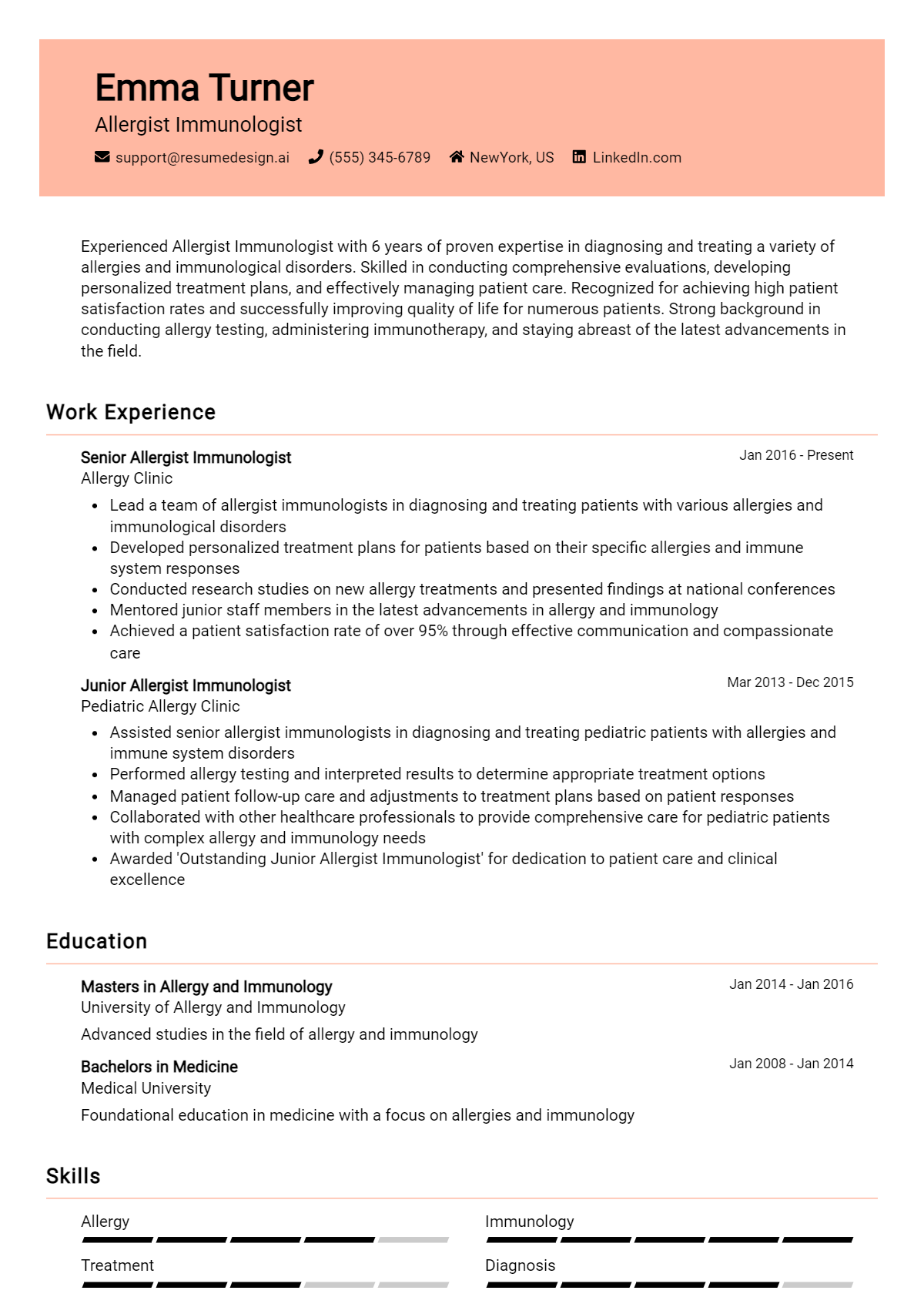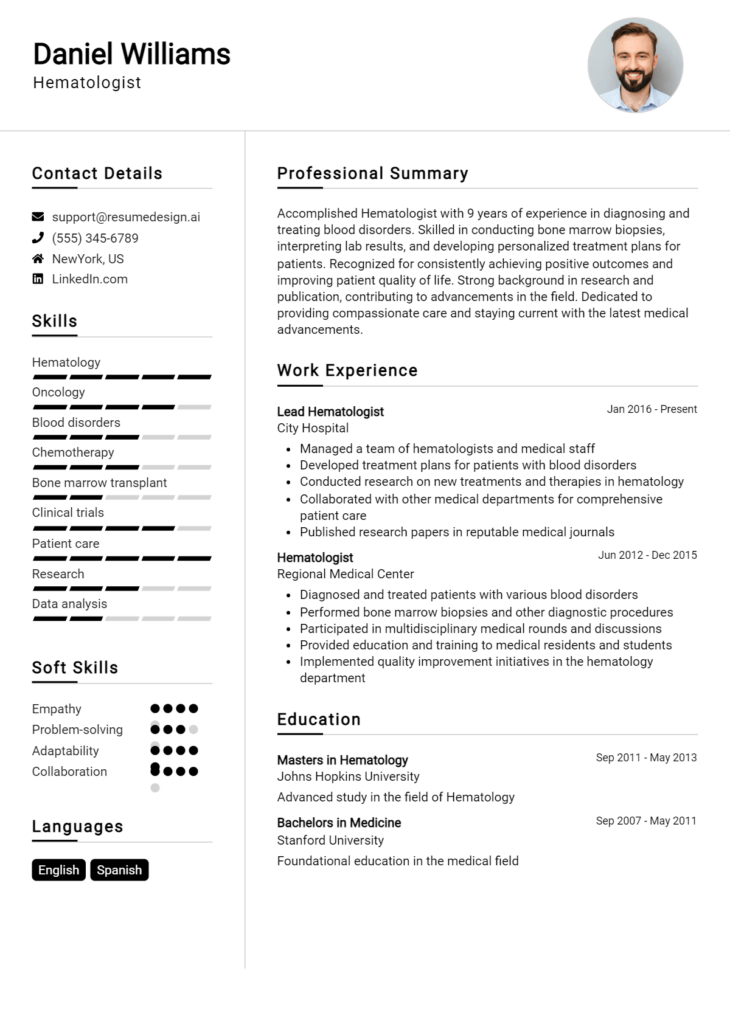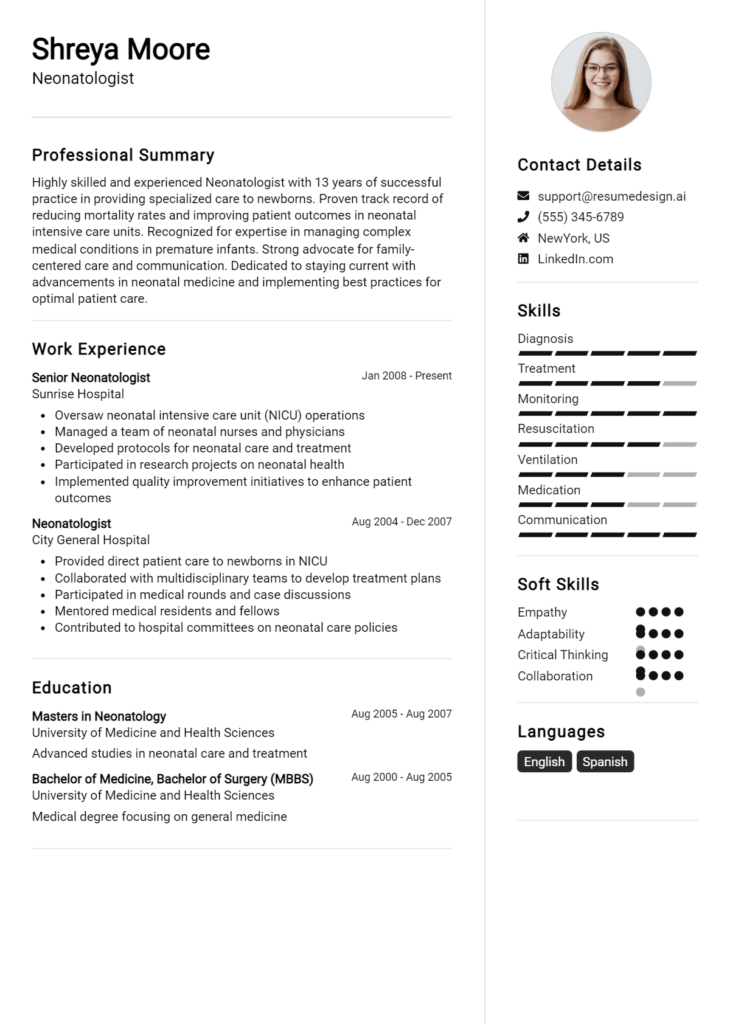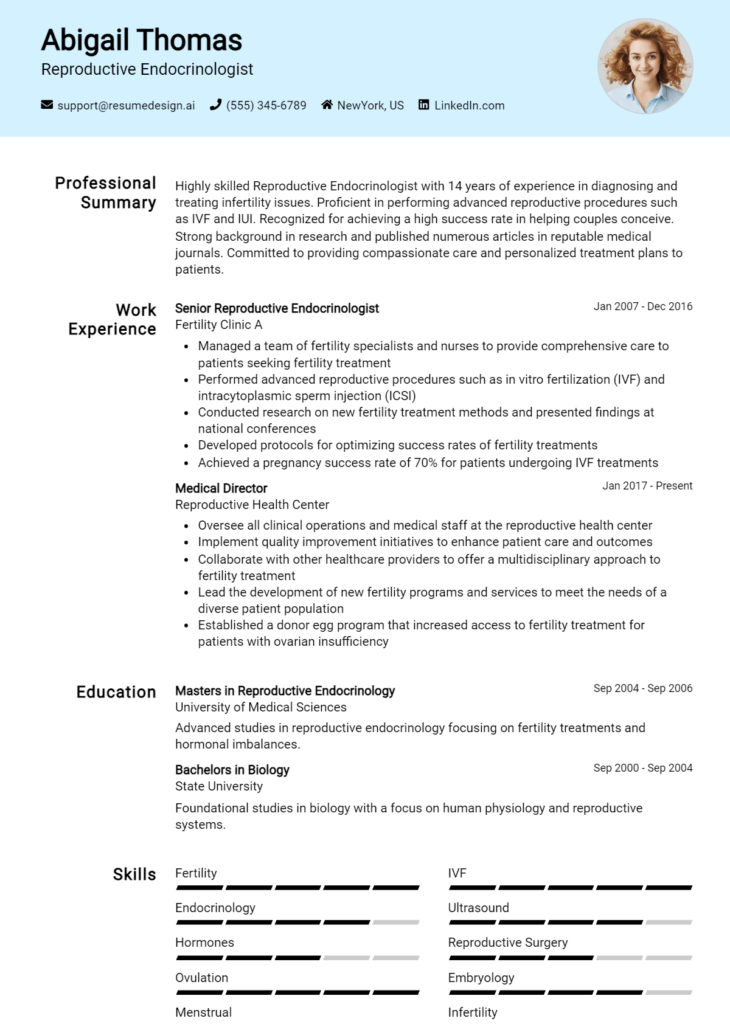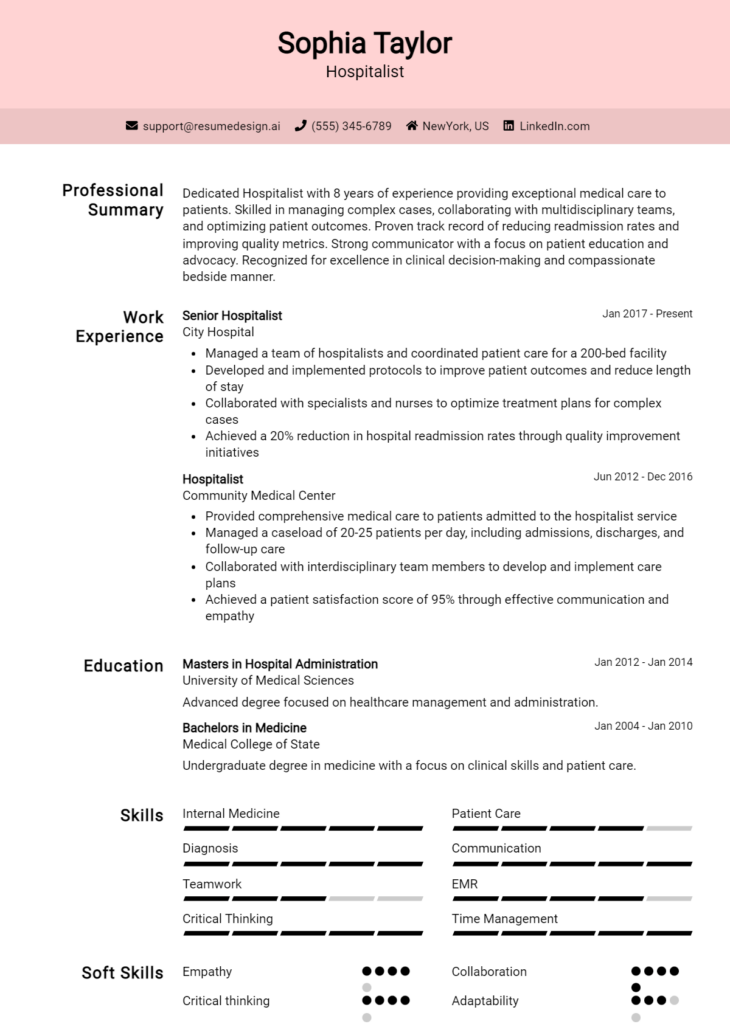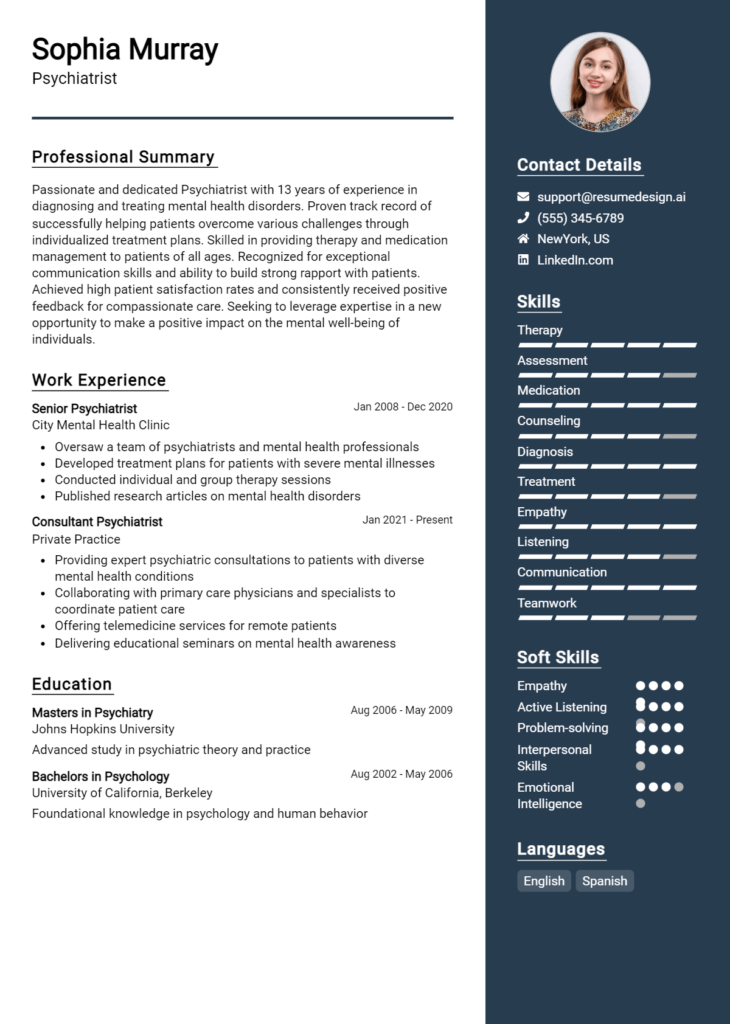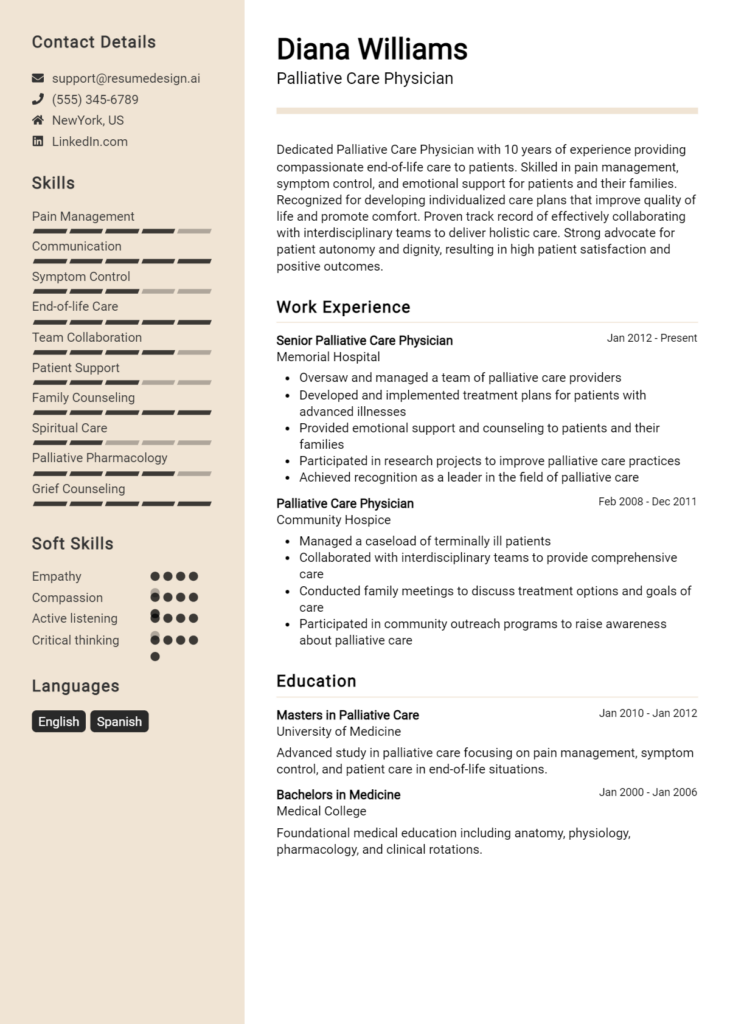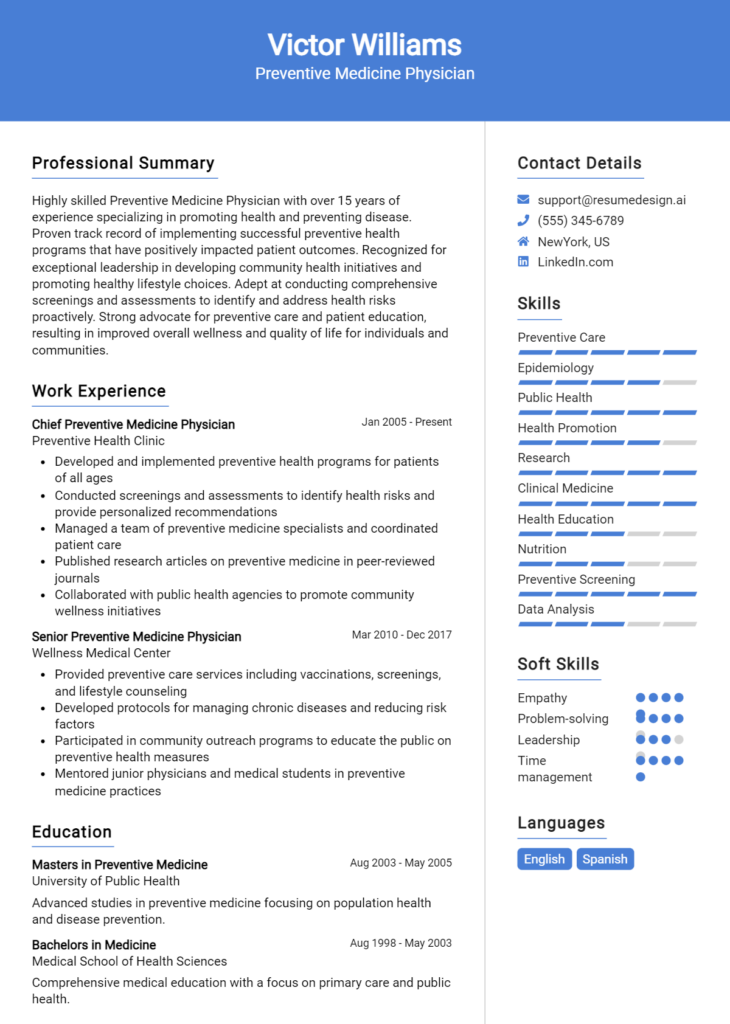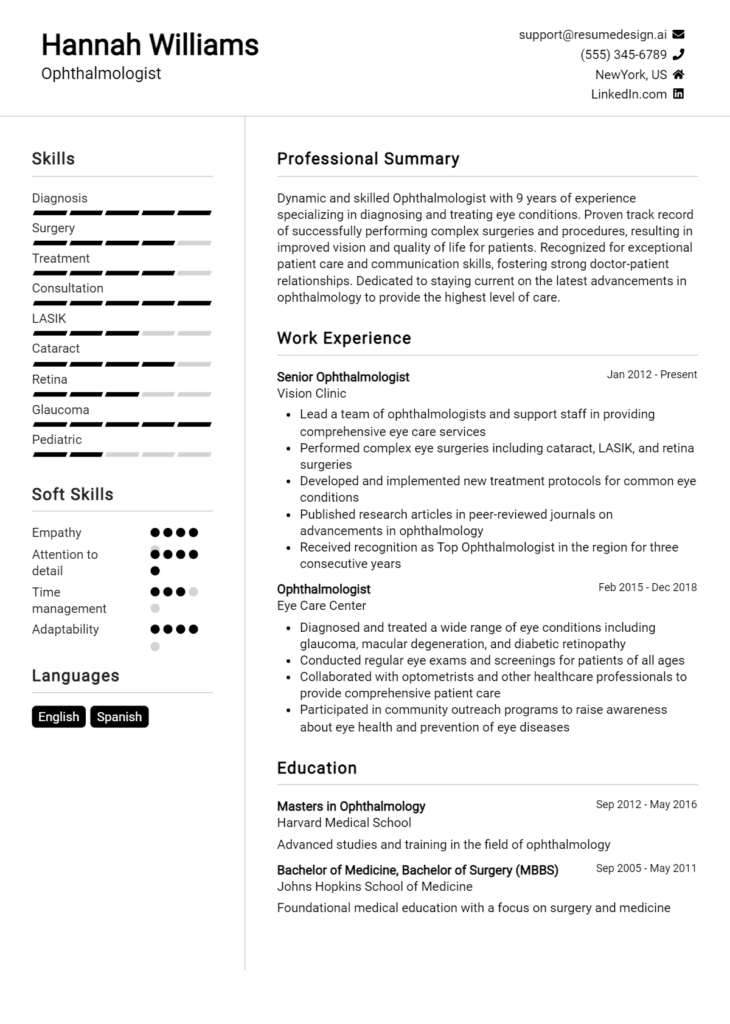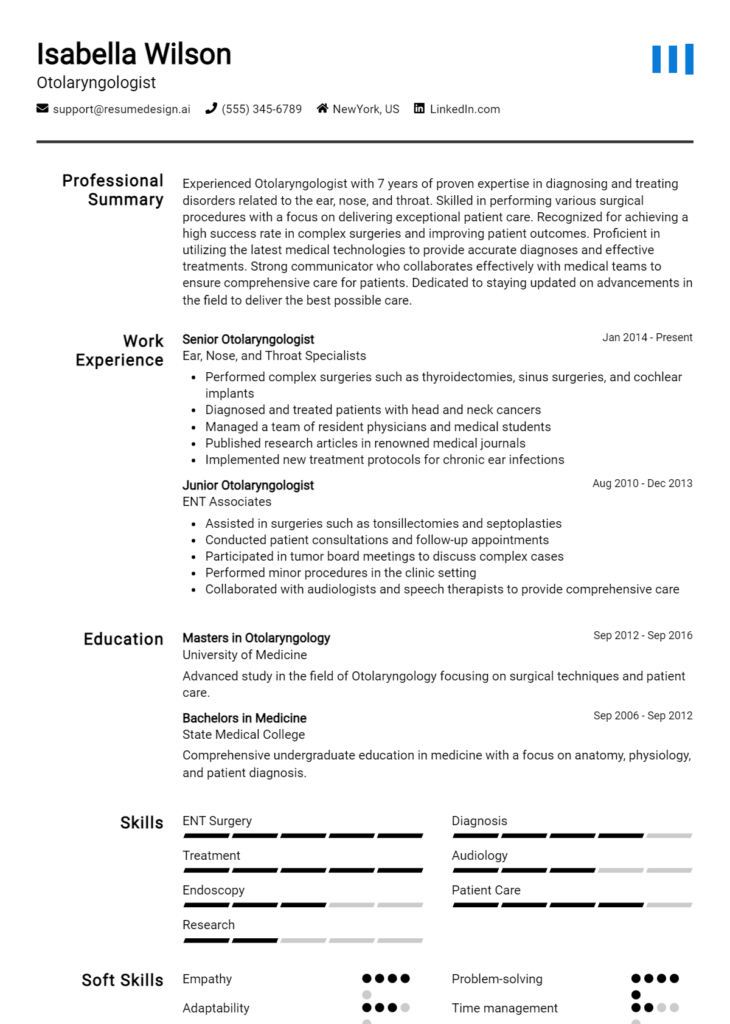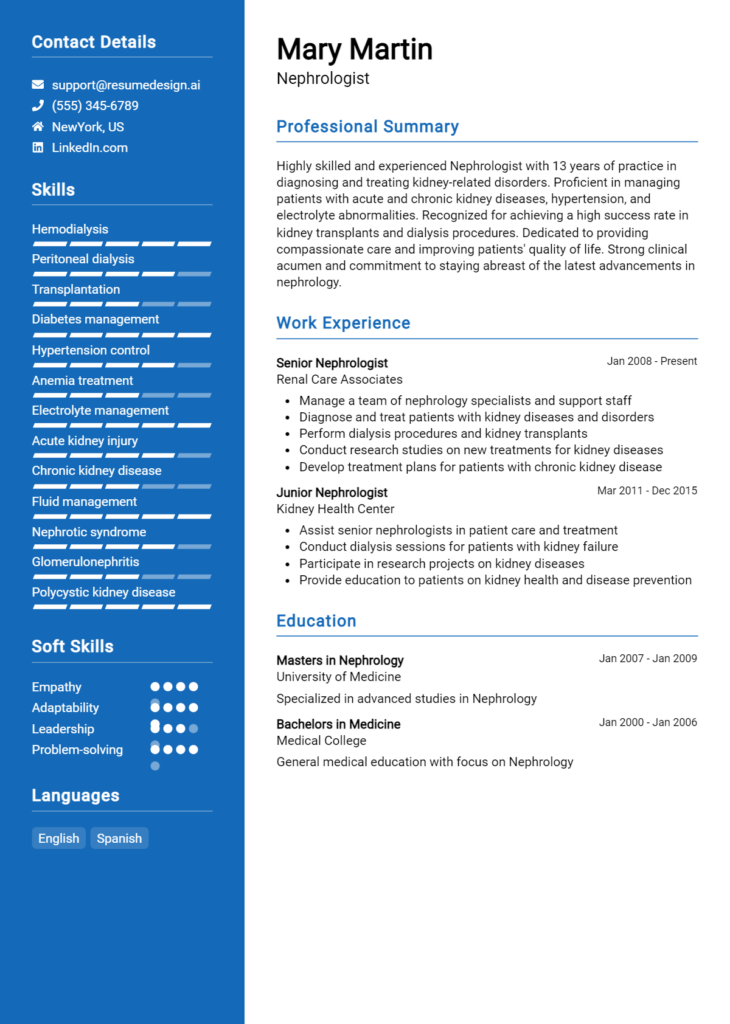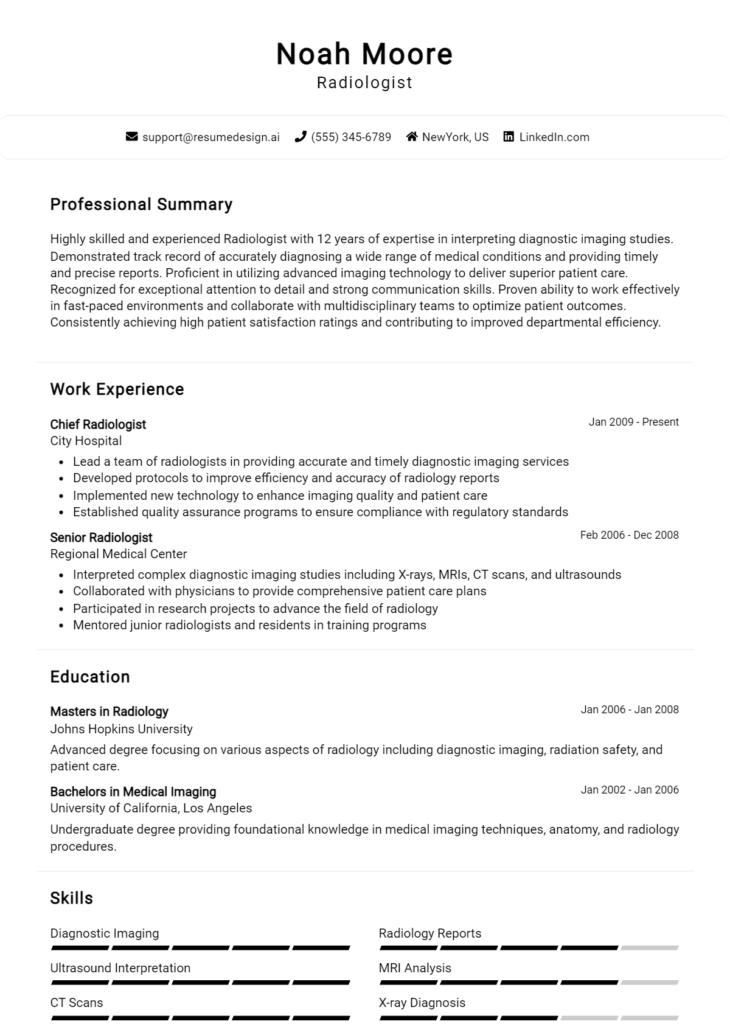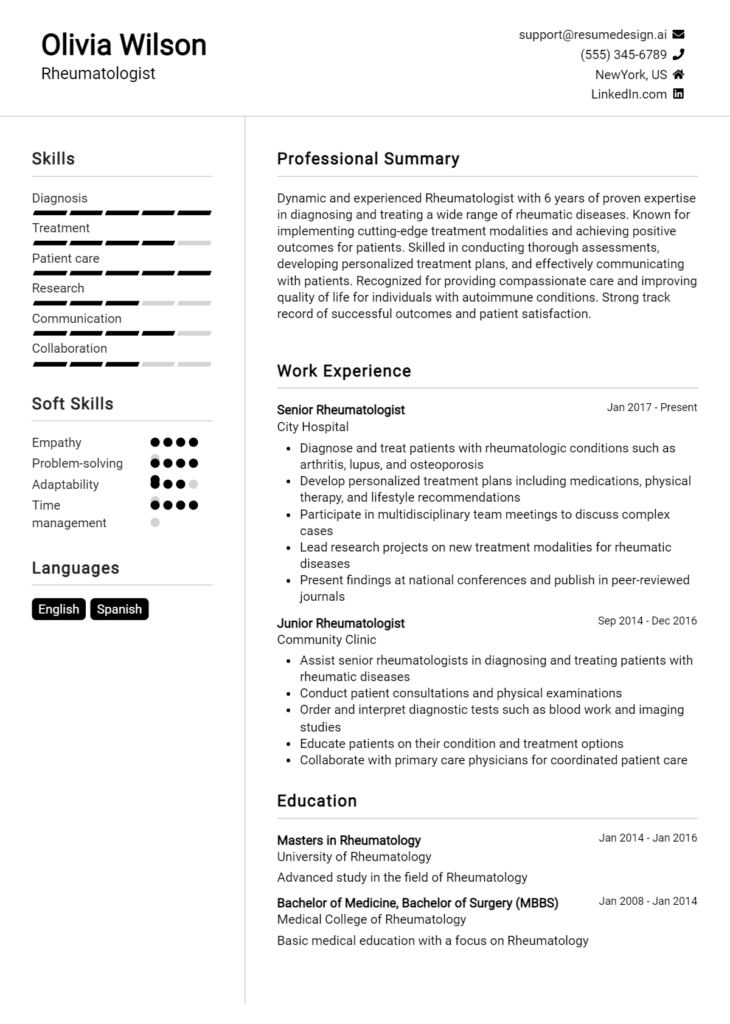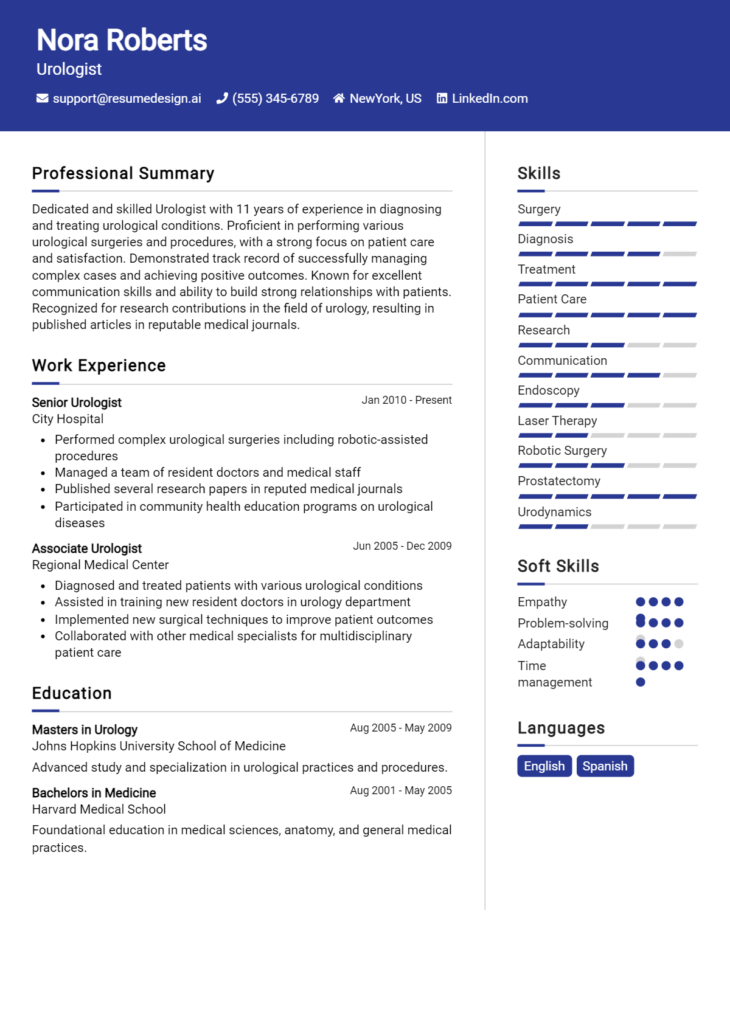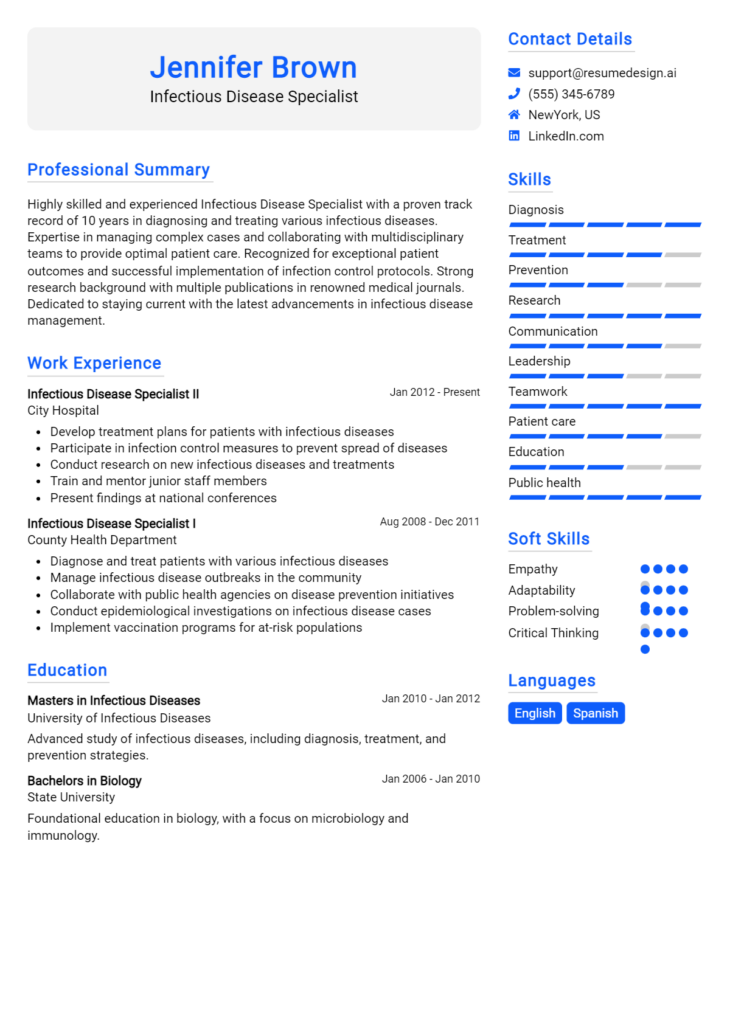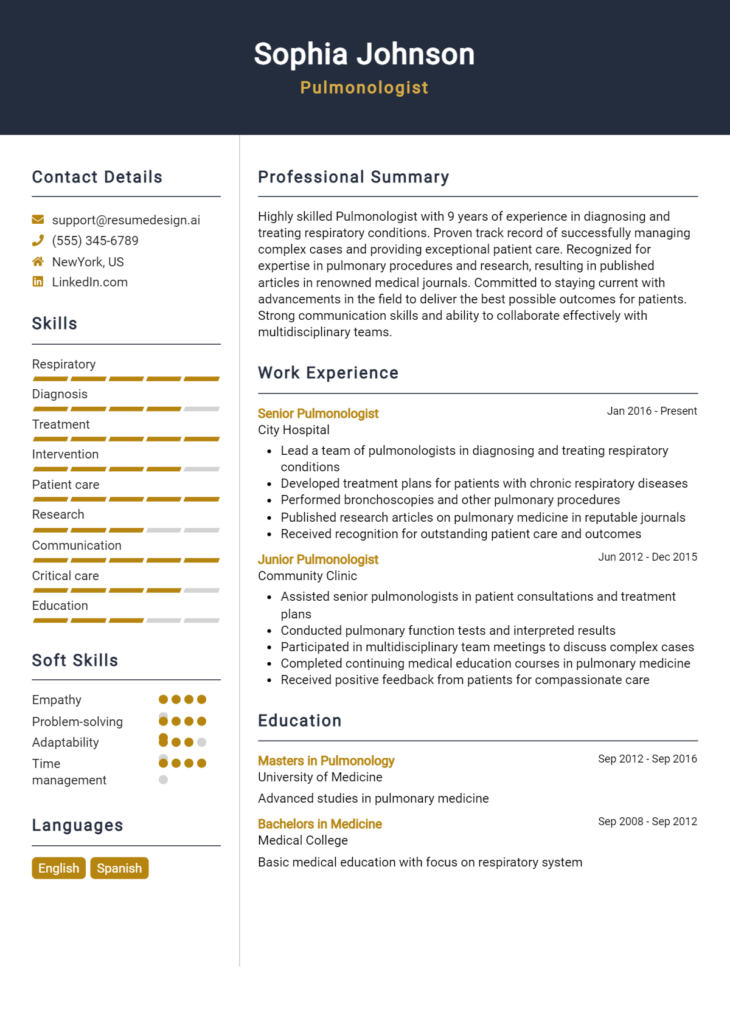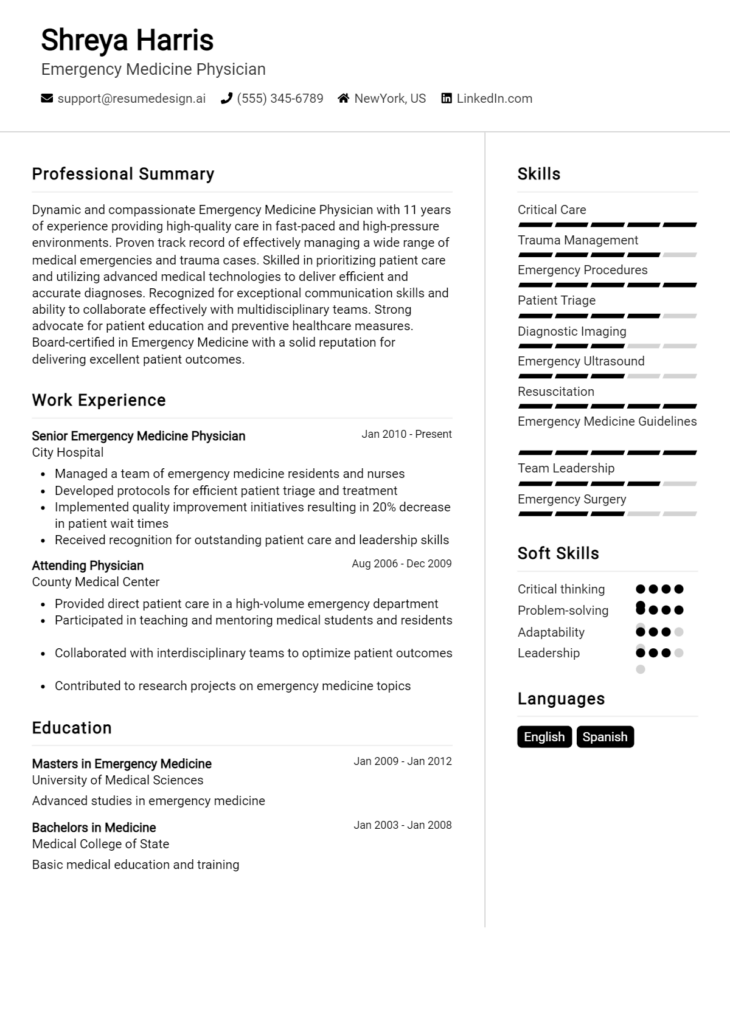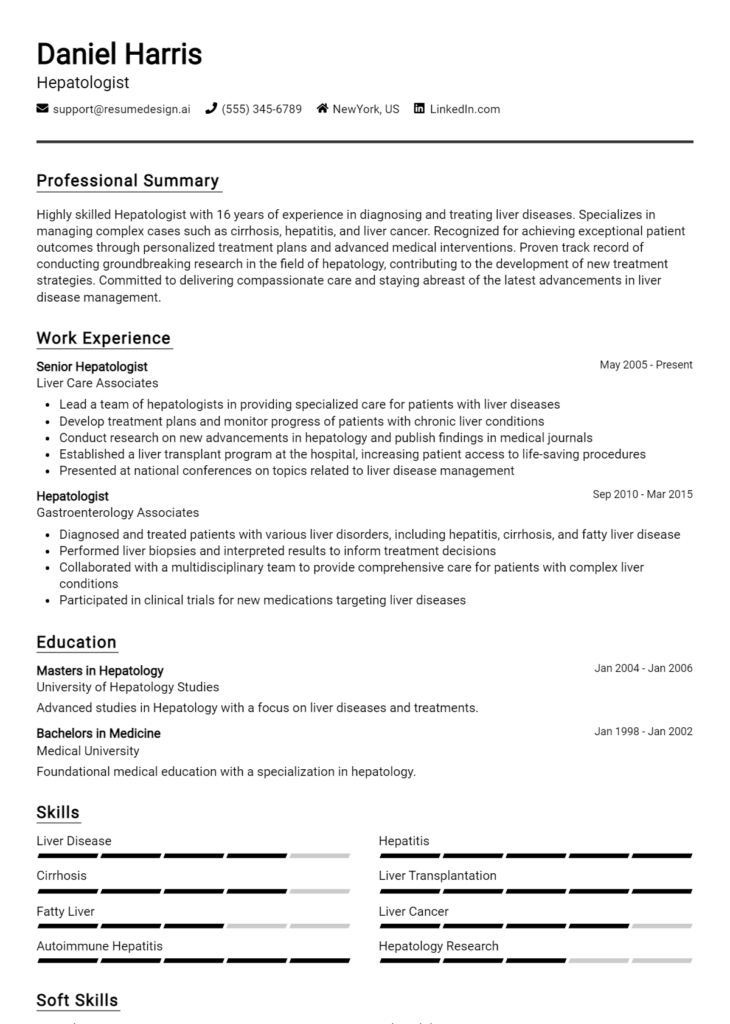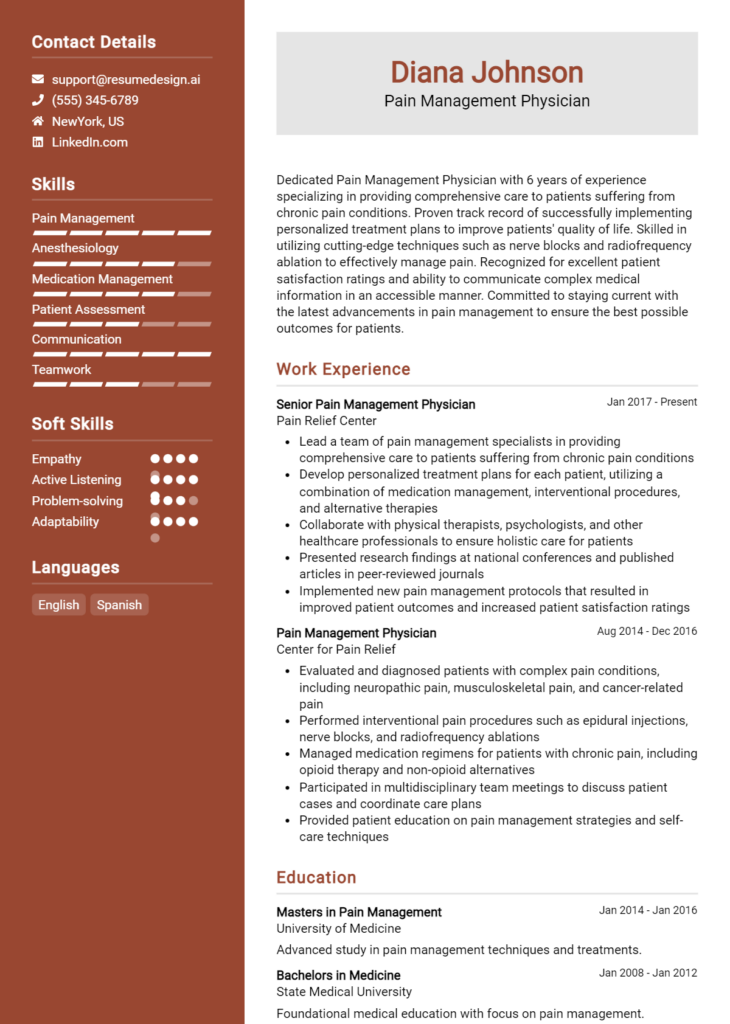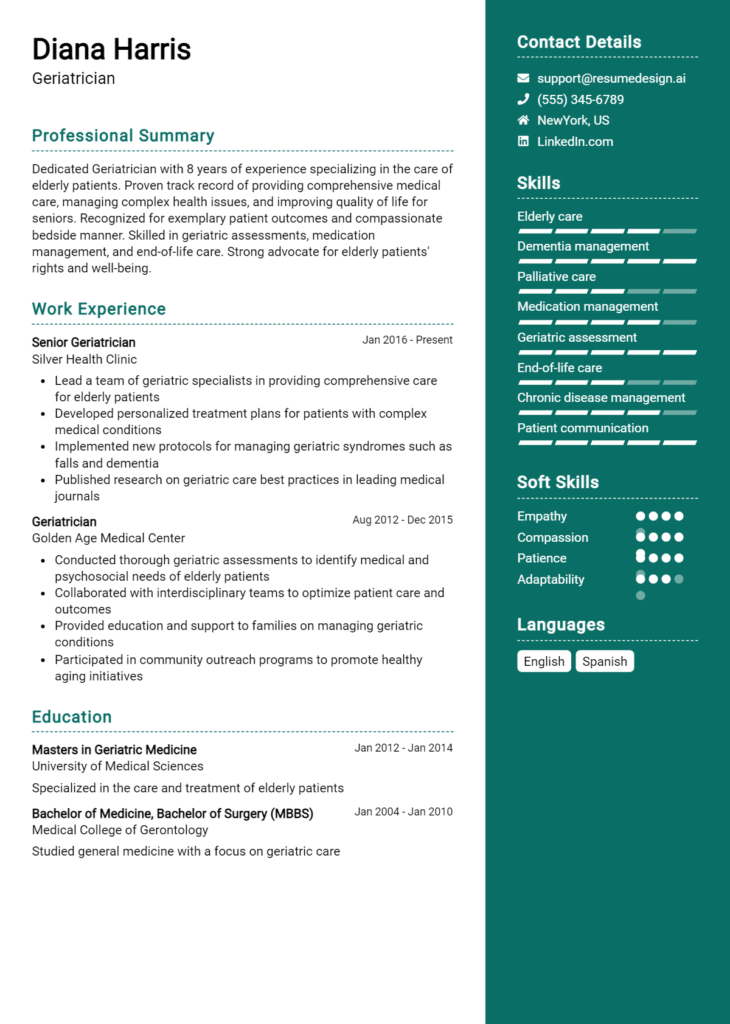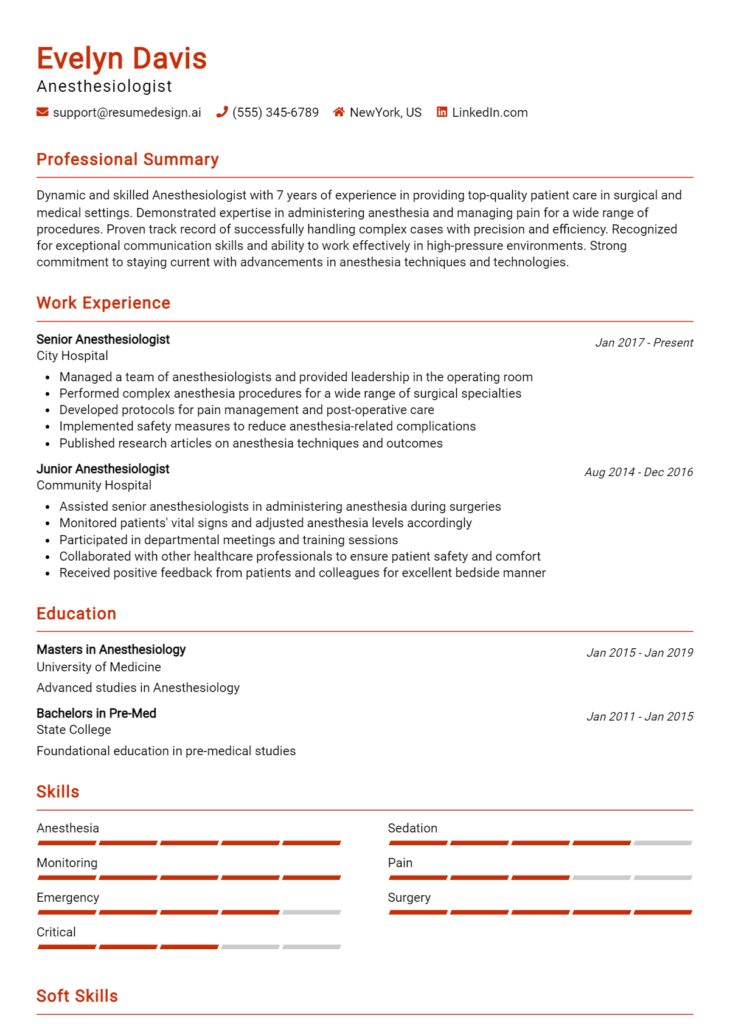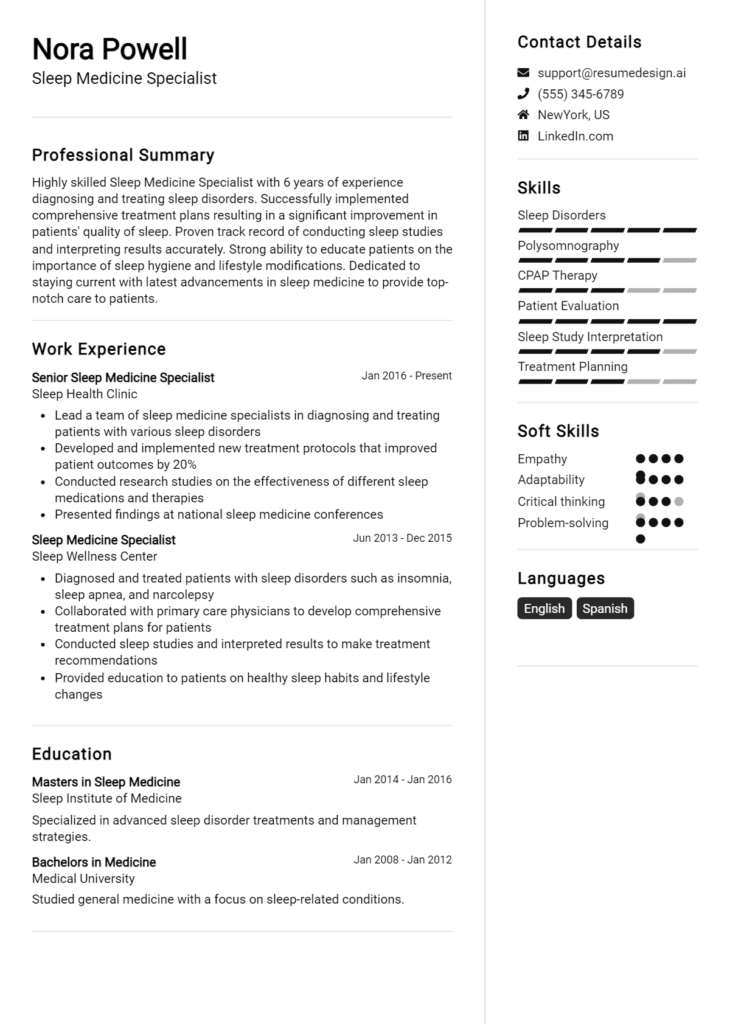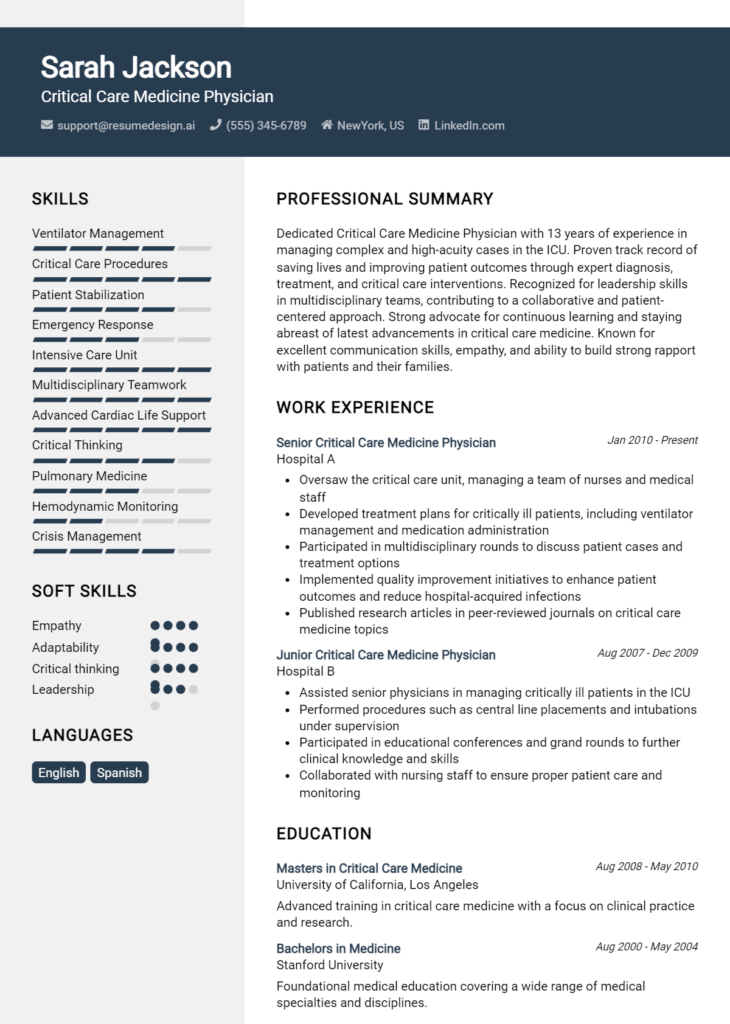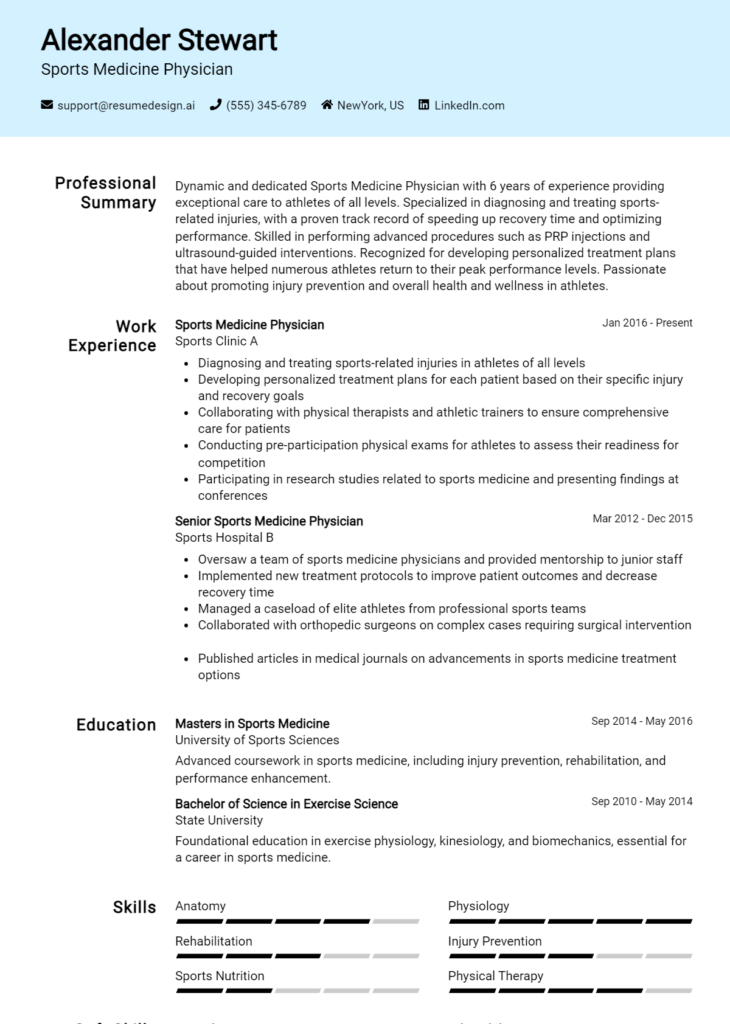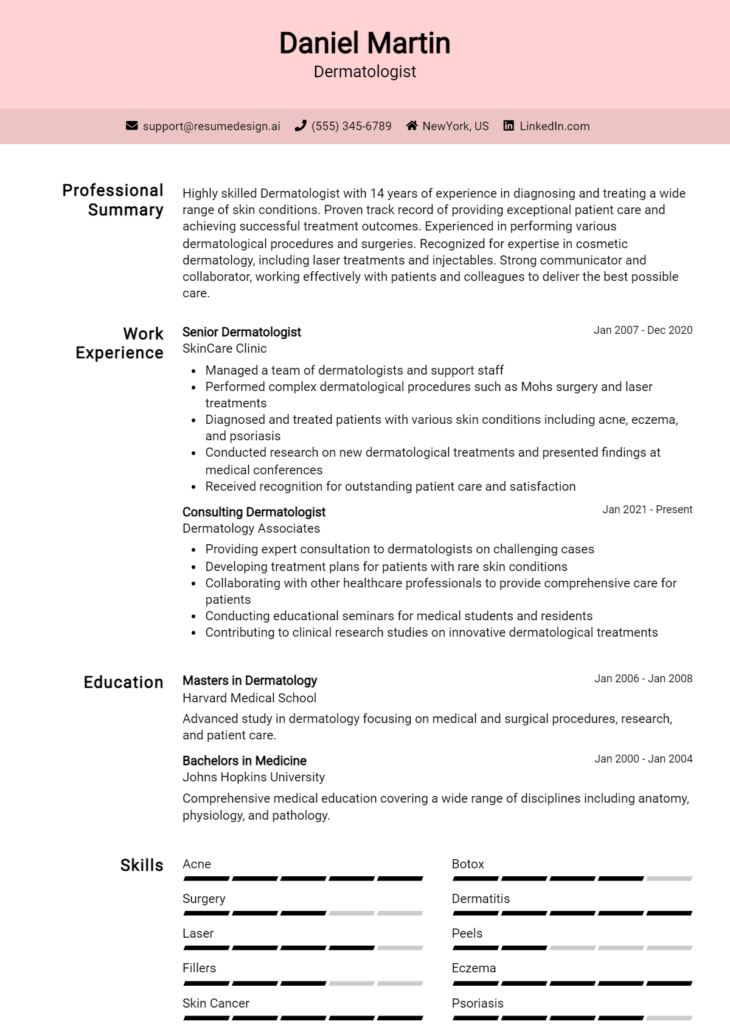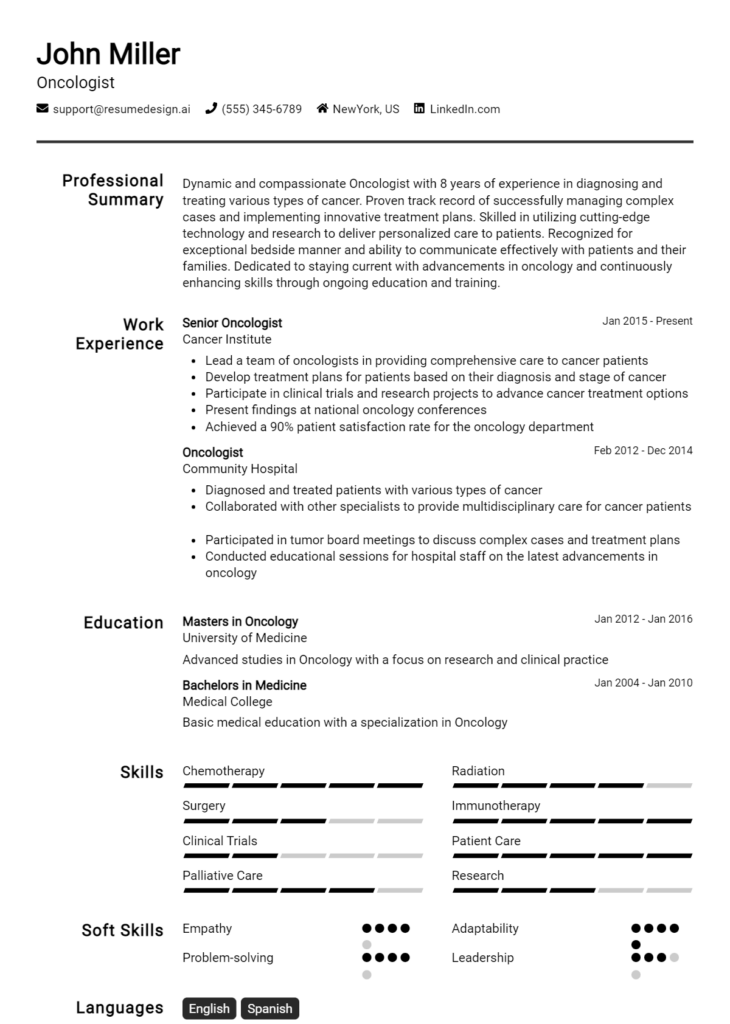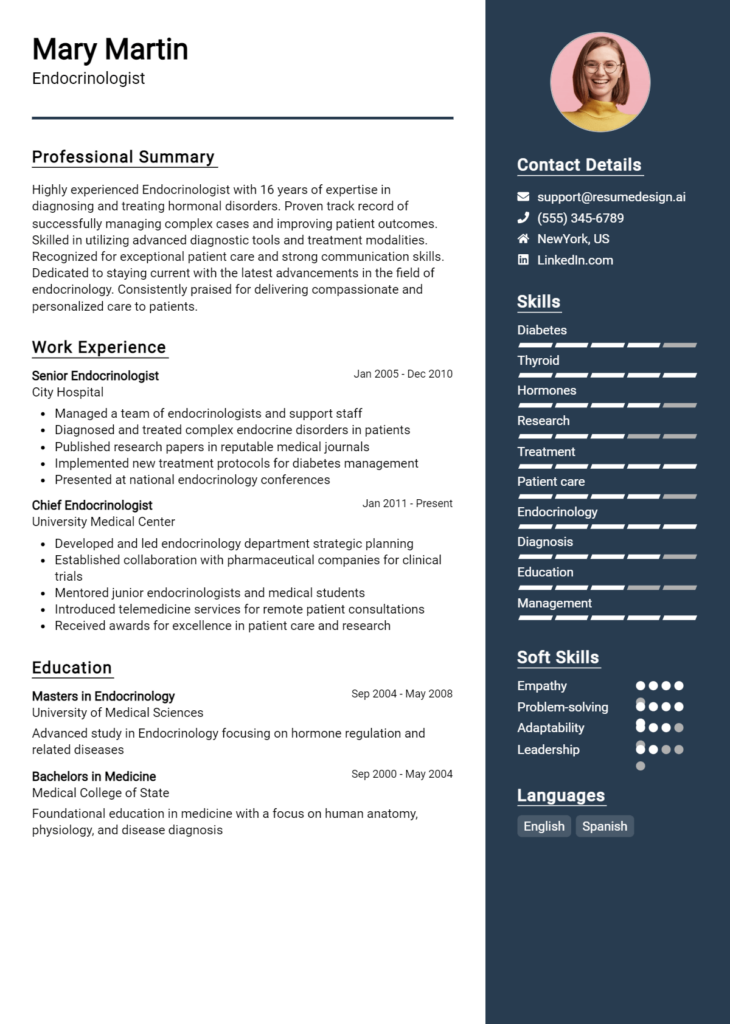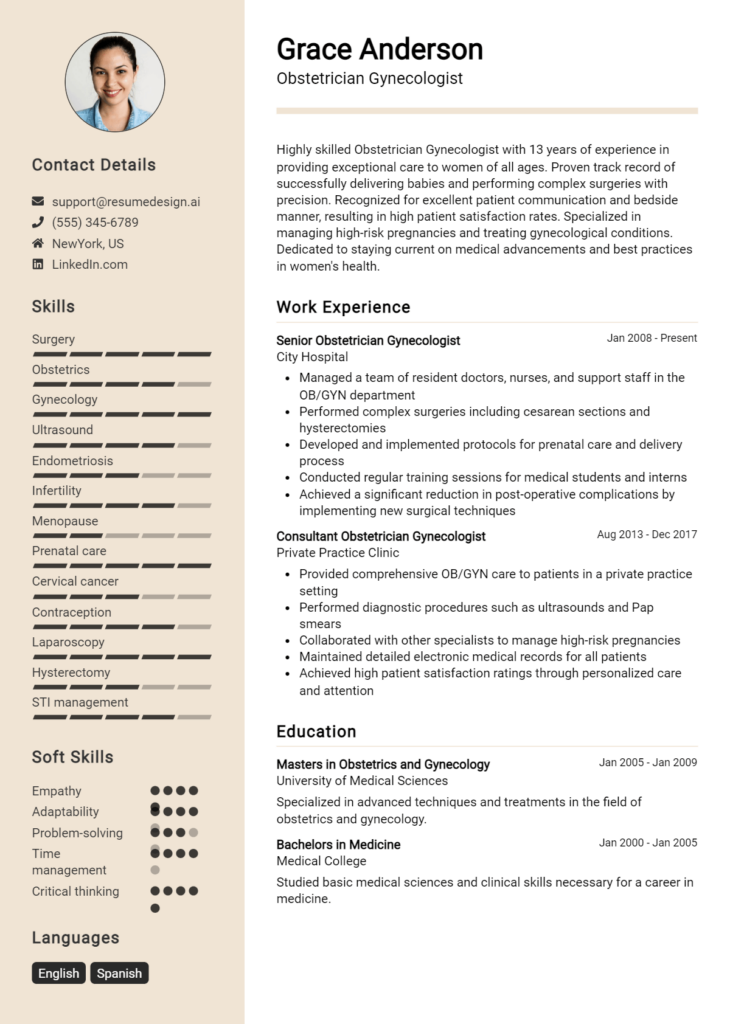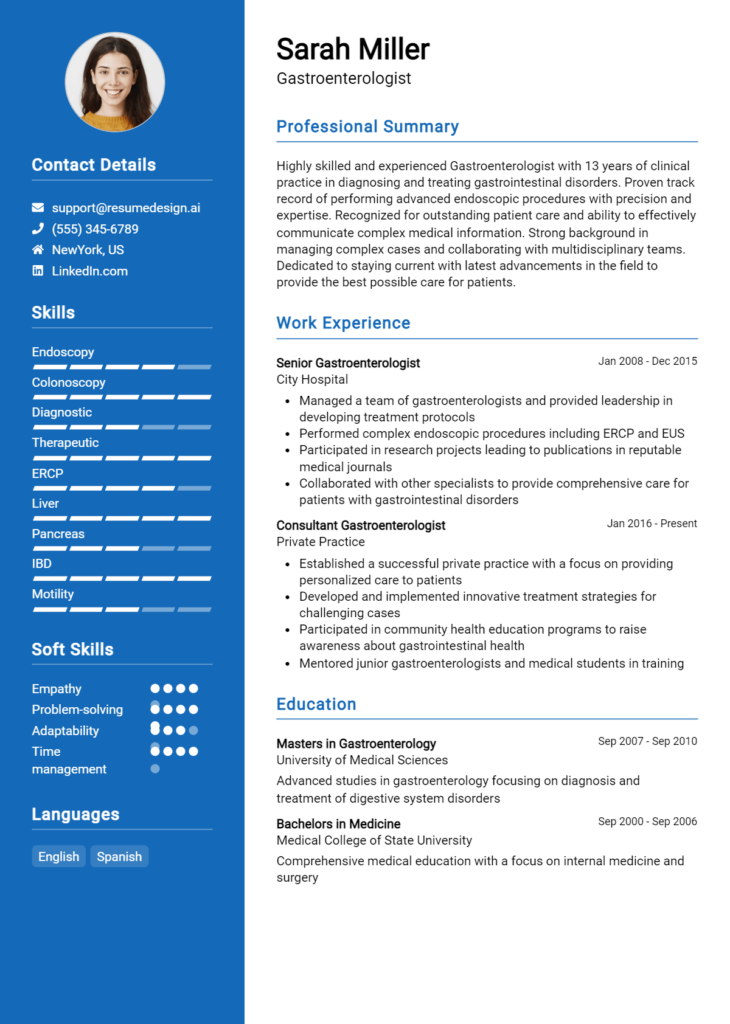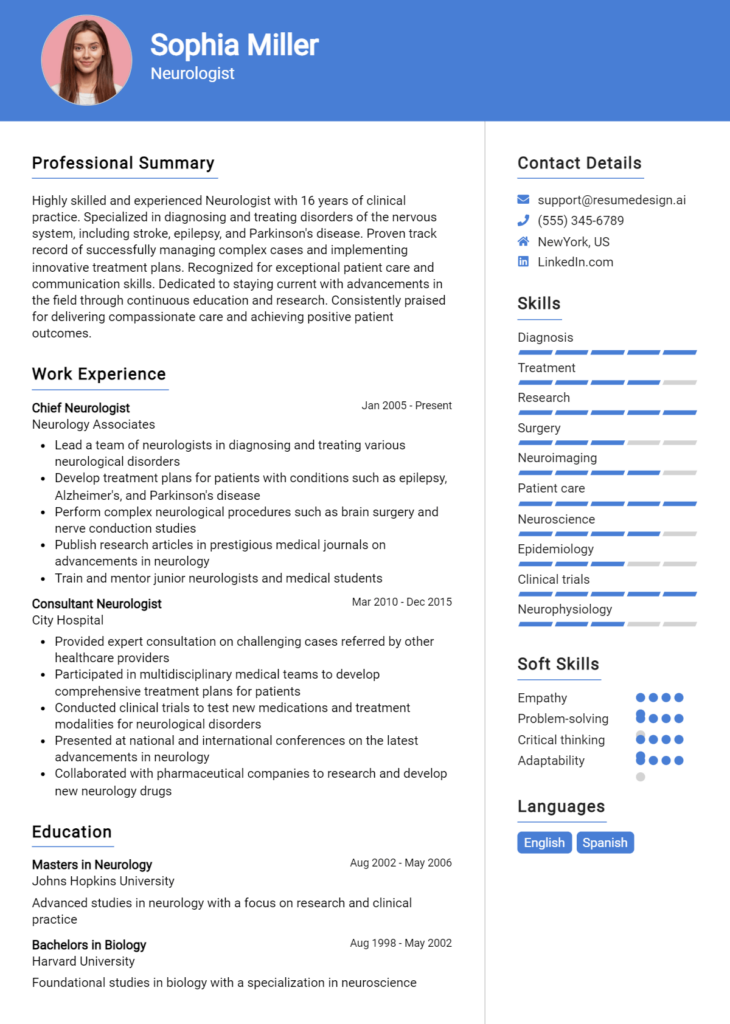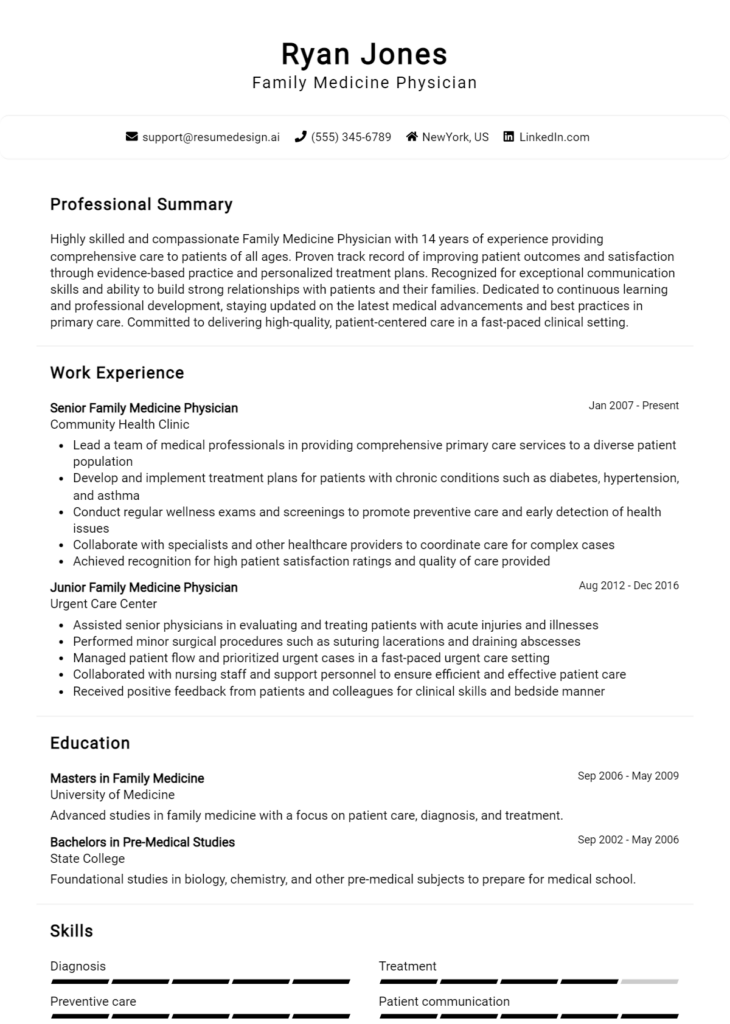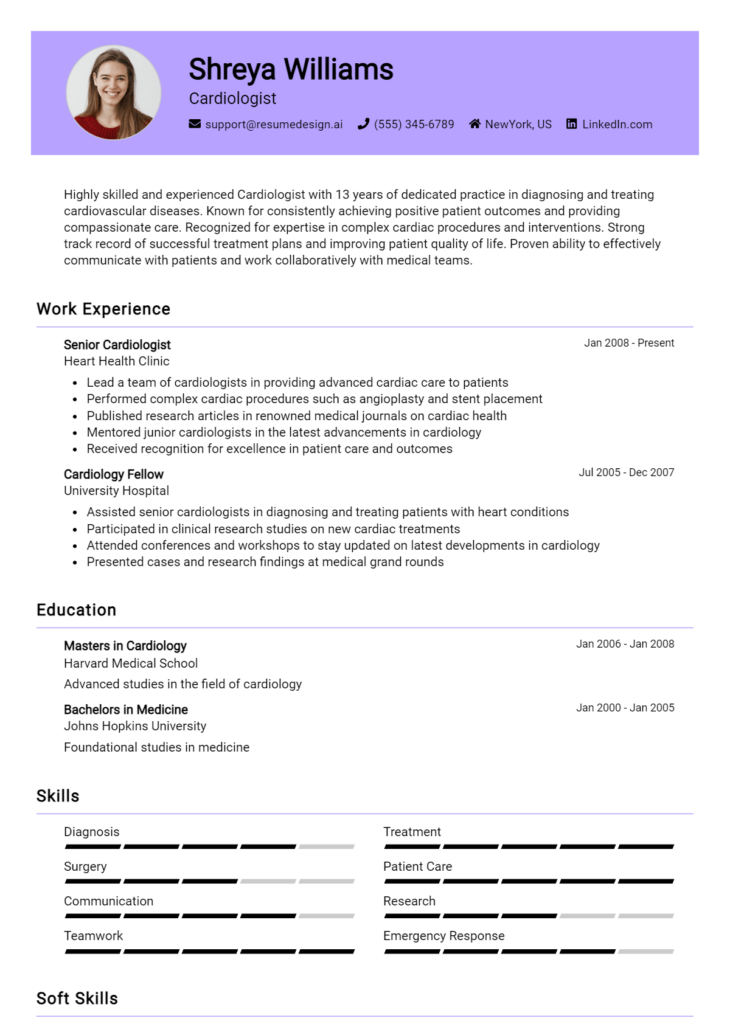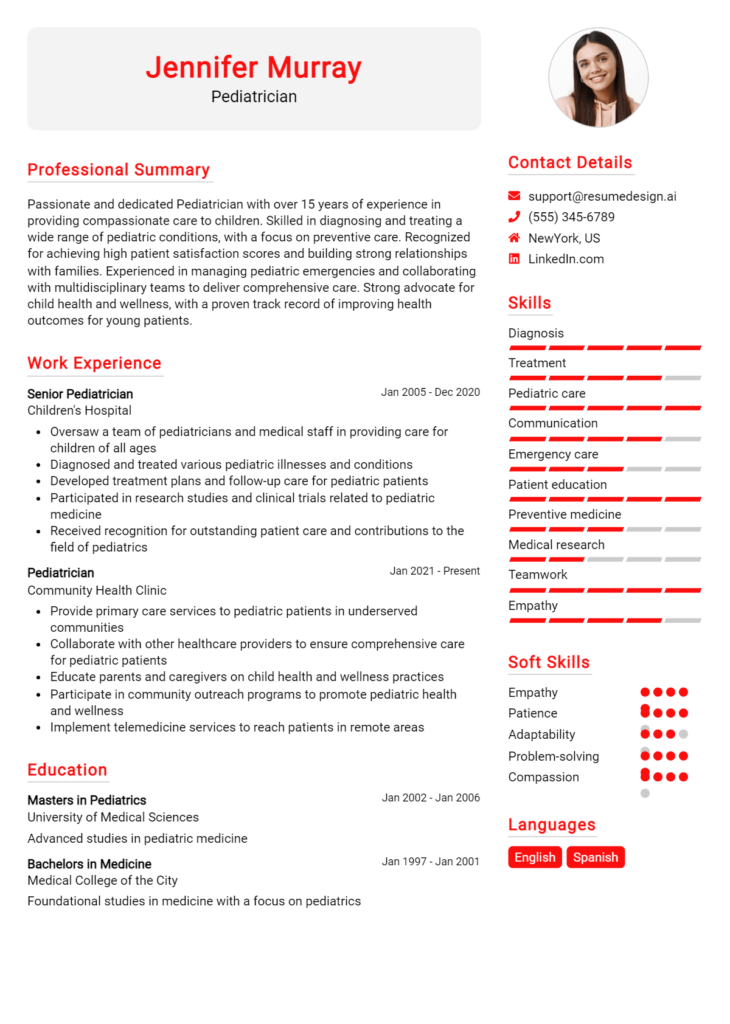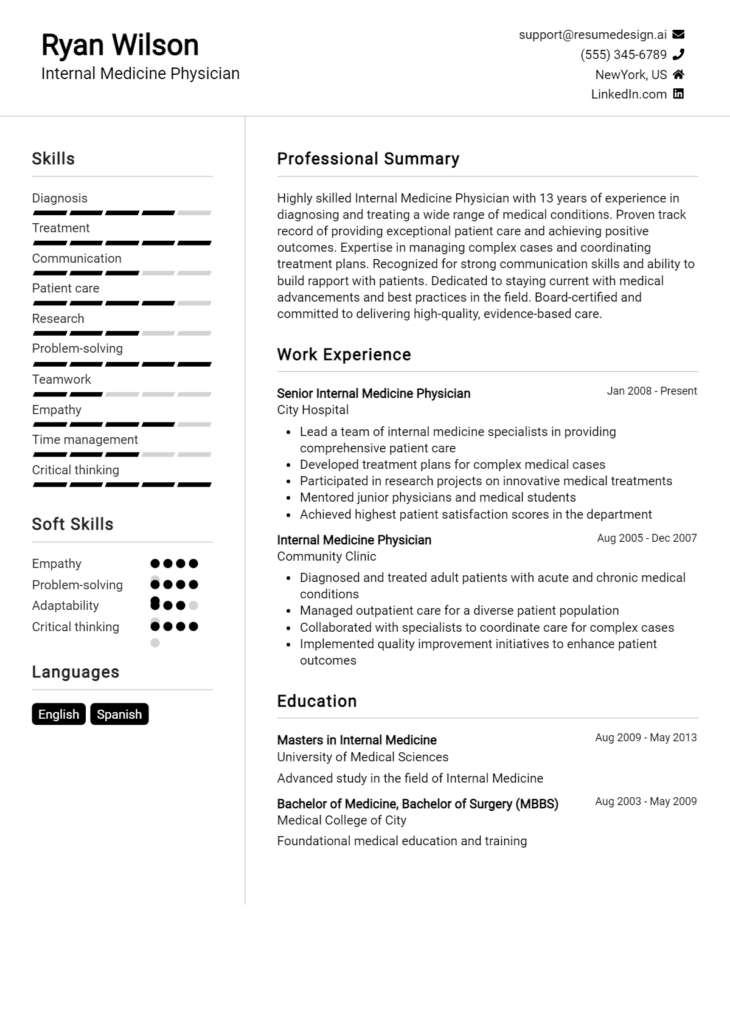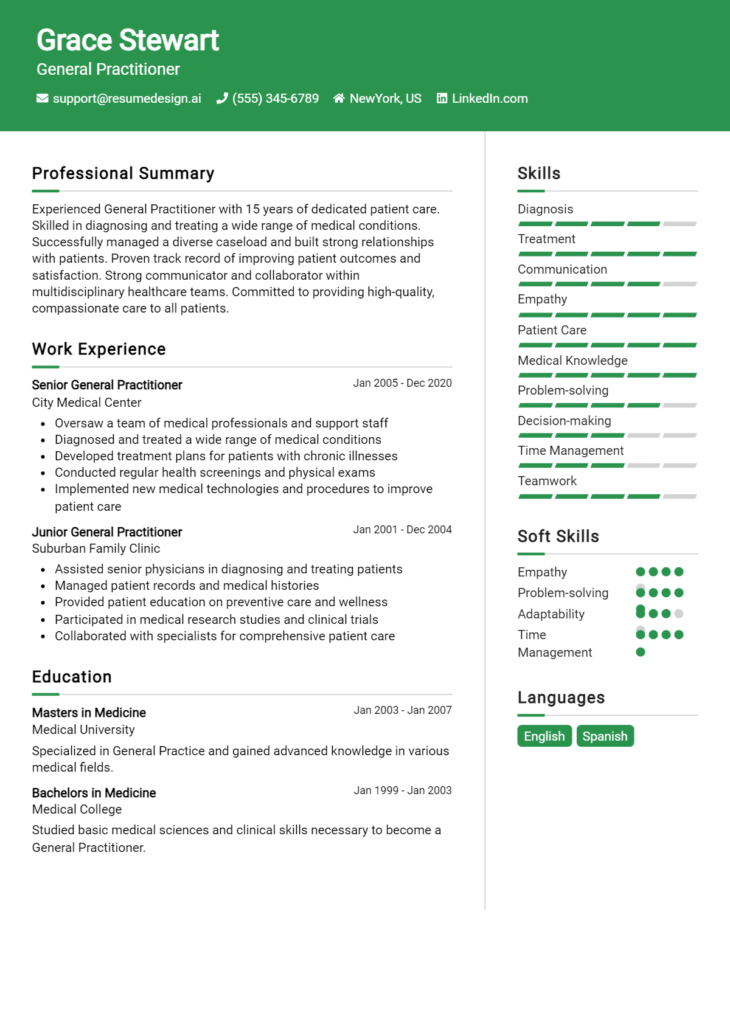Allergist/Immunologist Core Responsibilities
An Allergist/Immunologist plays a crucial role in diagnosing and treating allergic and immune system disorders, bridging various departments such as primary care, pediatrics, and pulmonology. Key responsibilities include conducting thorough patient assessments, interpreting diagnostic tests, and developing personalized treatment plans. Essential skills encompass technical knowledge of immunology, operational efficiency in patient management, and problem-solving abilities for complex cases. These competencies significantly contribute to organizational goals, and a well-structured resume can effectively showcase these qualifications to potential employers.
Common Responsibilities Listed on Allergist/Immunologist Resume
- Conduct comprehensive evaluations of patients with allergic and immunologic conditions.
- Perform and interpret skin tests for allergies.
- Order and analyze laboratory tests related to immune function.
- Develop individualized treatment plans, including immunotherapy.
- Educate patients on managing allergies and autoimmune disorders.
- Collaborate with other healthcare providers for coordinated patient care.
- Stay updated on the latest research and treatment protocols in immunology.
- Document patient interactions and treatment outcomes accurately.
- Participate in clinical trials and research initiatives.
- Advise on environmental controls and lifestyle modifications for patients.
- Manage allergic reactions and acute care situations effectively.
High-Level Resume Tips for Allergist/Immunologist Professionals
A well-crafted resume is an essential tool for Allergist/Immunologist professionals, as it serves as the first impression a candidate makes on potential employers. In a highly specialized field where expertise and precision are paramount, your resume must effectively reflect not only your medical skills but also your achievements and contributions to the field of allergy and immunology. A compelling resume can set you apart from other candidates, highlighting your unique qualifications and experiences. This guide will provide practical and actionable resume tips specifically tailored for Allergist/Immunologist professionals, ensuring you present yourself in the best possible light to prospective employers.
Top Resume Tips for Allergist/Immunologist Professionals
- Tailor your resume to each job description by incorporating relevant keywords and phrases that align with the specific requirements of the position.
- Showcase your relevant clinical experience, including internships, fellowships, and any specialized training that highlights your expertise in allergy and immunology.
- Quantify your achievements by including metrics where possible, such as the number of patients treated, improvement rates, or successful outcomes from specific interventions.
- Highlight industry-specific skills, such as proficiency in diagnostic testing, patient management, research contributions, and familiarity with current treatment protocols.
- Include any certifications, licenses, and membership in professional organizations that demonstrate your commitment to ongoing education and professional development.
- Summarize your professional philosophy or approach to patient care in a brief profile statement at the top of your resume to provide context to your experience.
- Utilize a clean and professional format that enhances readability, making it easy for hiring managers to find the information they need quickly.
- Incorporate any research publications, presentations, or speaking engagements that showcase your contributions to the field and your commitment to advancing allergy and immunology practices.
- List relevant volunteer work or community service related to health and wellness, as this can demonstrate your dedication to patient care beyond the clinical setting.
By implementing these tips, you can significantly enhance your resume and increase your chances of landing a job in the Allergist/Immunologist field. A well-structured resume that effectively showcases your skills and achievements will not only attract the attention of hiring managers but also position you as a strong candidate in a competitive job market.
Why Resume Headlines & Titles are Important for Allergist/Immunologist
In the competitive field of allergology and immunology, a well-crafted resume headline or title serves as a vital first impression for potential employers. A strong headline can immediately captivate hiring managers, summarizing a candidate's key qualifications in just a few impactful words. This concise representation should be relevant and directly related to the specific job being applied for, effectively setting the tone for the rest of the resume. A compelling headline not only highlights the candidate's expertise but also distinguishes them from other applicants, making it an essential element in the job application process.
Best Practices for Crafting Resume Headlines for Allergist/Immunologist
- Keep it concise: Aim for a headline that is brief yet informative, ideally one to two lines long.
- Be role-specific: Tailor the headline to reflect the position you are applying for, emphasizing relevant skills and experiences.
- Highlight key qualifications: Use specific language that captures your most important skills or achievements in the field.
- Use strong action words: Begin with powerful verbs that convey your capabilities and expertise.
- Avoid jargon: Ensure that the language is accessible and understandable to all hiring managers.
- Incorporate metrics when possible: If applicable, use quantifiable achievements to enhance credibility.
- Make it unique: Differentiate yourself with a headline that showcases your individual strengths and specialties.
- Review and revise: Edit your headline multiple times to ensure clarity and impact.
Example Resume Headlines for Allergist/Immunologist
Strong Resume Headlines
"Board-Certified Allergist with 10 Years of Experience in Pediatric Immunology"
“Expert in Allergy Management and Immunotherapy with Proven Patient Outcomes”
“Dedicated Allergist Committed to Advancing Research in Allergic Diseases”
Weak Resume Headlines
“Allergist Looking for Job”
“Experienced Professional”
The strong headlines effectively highlight specific qualifications and areas of expertise, conveying a clear message about the candidate's capabilities and what they bring to the table. In contrast, the weak headlines lack specificity and fail to engage the reader, making them forgettable and ineffective in showcasing the candidate's potential. Strong headlines create intrigue and interest, while weak ones leave hiring managers uninspired and uninterested.
Writing an Exceptional Allergist/Immunologist Resume Summary
A resume summary is a crucial component for an Allergist/Immunologist as it serves as the first impression for hiring managers, allowing them to quickly assess a candidate's qualifications. A strong summary effectively highlights key skills, relevant experience, and notable accomplishments tailored to the specific job, ensuring that the candidate stands out in a competitive field. By being concise yet impactful, the summary gives a snapshot of the candidate's professional identity, making it easier for employers to recognize their potential fit for the role.
Best Practices for Writing a Allergist/Immunologist Resume Summary
- Quantify Achievements: Use numbers to demonstrate the impact of your work, such as patient outcomes or successful treatment plans.
- Focus on Key Skills: Highlight specific skills relevant to the position, such as diagnostic expertise or immunotherapy knowledge.
- Tailor for the Job Description: Customize your summary to reflect the language and requirements of the job you're applying for.
- Be Concise: Aim for 2-4 sentences that deliver the most important information without unnecessary detail.
- Showcase Accomplishments: Include notable achievements that distinguish you from other candidates.
- Use Action Words: Start sentences with strong action verbs to convey confidence and expertise.
- Reflect Your Passion: Demonstrate your commitment to patient care and advancements in immunology and allergy treatment.
- Maintain Professional Tone: Ensure the summary reflects a professional demeanor suitable for the medical field.
Example Allergist/Immunologist Resume Summaries
Strong Resume Summaries
Board-certified Allergist/Immunologist with over 10 years of experience in clinical practice, successfully diagnosing and treating over 2,500 patients annually with a 95% satisfaction rate. Expertise in implementing advanced immunotherapy protocols that resulted in a 40% improvement in patient outcomes.
Compassionate Allergist with a robust background in pediatric allergies, having treated more than 1,000 children. Developed innovative treatment plans that reduced the incidence of allergic reactions by 30% in a high-risk population through patient education and follow-up care.
Dedicated Immunologist with a Ph.D. in Immunology and 8 years in clinical research, leading studies that contributed to the development of a new allergy treatment currently in Phase III trials. Skilled in data analysis and patient management, ensuring a personalized approach to care.
Weak Resume Summaries
Experienced doctor looking for a position in allergy and immunology. I have worked with many patients and have a good understanding of different treatments.
Allergist with some experience treating patients. I am interested in working in a busy clinic and helping patients with allergies.
The strong resume summaries are effective because they provide specific details about achievements, quantify results, and highlight relevant skills that align with the job role. They demonstrate the candidate's expertise and impact in the field, making them compelling to hiring managers. In contrast, the weak summaries lack specificity and measurable outcomes, making them too generic to capture interest or demonstrate true capability in the role.
Work Experience Section for Allergist/Immunologist Resume
The work experience section of an Allergist/Immunologist resume is crucial as it serves as a platform to demonstrate the candidate's technical skills and clinical expertise in managing allergic and immunologic disorders. This section not only highlights the ability to deliver high-quality patient care but also showcases leadership capabilities, particularly in managing healthcare teams and collaborating with multidisciplinary professionals. By quantifying achievements and aligning experience with industry standards, candidates can effectively illustrate their contributions and the impact they've had in previous roles, making a compelling case for their candidacy.
Best Practices for Allergist/Immunologist Work Experience
- Highlight specific technical skills relevant to allergy and immunology, such as diagnostic techniques and treatment methodologies.
- Quantify achievements where possible, using metrics like patient outcomes, number of patients treated, or improvements in treatment efficacy.
- Include details about collaboration with other healthcare professionals, showcasing teamwork in complex cases.
- Focus on leadership roles and responsibilities, demonstrating the ability to manage teams effectively.
- Use action verbs to describe responsibilities and accomplishments, making them more impactful.
- Tailor experience descriptions to align with industry standards and job descriptions for Allergists/Immunologists.
- Incorporate relevant certifications and training that enhance credibility.
- Maintain a clear and concise format to enhance readability and engagement.
Example Work Experiences for Allergist/Immunologist
Strong Experiences
- Led a team of 5 healthcare professionals in the development of a new protocol for managing severe allergic reactions, resulting in a 30% decrease in emergency room visits.
- Implemented an allergy testing program that increased patient diagnosis rates by 40%, improving overall patient care and satisfaction scores.
- Conducted over 500 patient consultations annually, achieving a 95% satisfaction rate through effective treatment plans and follow-up care.
- Collaborated with a multidisciplinary team to create educational materials for patients, enhancing community awareness and reducing hospitalizations related to allergic conditions by 20%.
Weak Experiences
- Worked with patients with allergies and immunologic issues.
- Participated in team meetings to discuss treatment options.
- Assisted in various procedures related to allergy testing.
- Helped manage patient care at the clinic.
The examples listed as strong experiences are considered effective because they provide specific, quantifiable outcomes that demonstrate the candidate's impact and leadership in their roles. They not only detail technical skills but also show a clear contribution to patient care and team dynamics. In contrast, the weak experiences lack specificity and measurable achievements, making them less compelling and failing to convey the candidate's true capabilities in the specialty of allergy and immunology.
Education and Certifications Section for Allergist/Immunologist Resume
The education and certifications section of an Allergist/Immunologist resume is crucial as it showcases the candidate's academic qualifications and specialized training in a highly specialized field. This section highlights the candidate's commitment to continuous learning and professional development, which is essential for staying current with advancements in allergy and immunology. By including relevant coursework, industry-recognized certifications, and specialized training, candidates can enhance their credibility and demonstrate their alignment with the demands of the role. A well-crafted education and certifications section can significantly impact a hiring manager's perception of a candidate's expertise and suitability for the position.
Best Practices for Allergist/Immunologist Education and Certifications
- Include all relevant degrees, such as Doctor of Medicine (MD) or Doctor of Osteopathic Medicine (DO), emphasizing any specialization in allergy and immunology.
- List board certifications, such as the American Board of Allergy and Immunology certification, to validate your expertise.
- Highlight any additional certifications in related areas, like asthma management or immunotherapy, to showcase further specialization.
- Provide details of any relevant coursework completed during medical school or residency that pertains to allergy and immunology.
- Incorporate any continuing medical education (CME) courses attended to demonstrate ongoing professional development.
- Use clear formatting to differentiate between degrees, certifications, and trainings for better readability.
- Tailor this section to align with the specific job requirements and responsibilities for the position you are applying for.
- Keep the information up to date, ensuring that all listed qualifications are current and relevant to the position.
Example Education and Certifications for Allergist/Immunologist
Strong Examples
- Doctor of Medicine (MD), Harvard Medical School, 2015
- Board Certified in Allergy and Immunology, American Board of Allergy and Immunology, 2018
- Completed a Fellowship in Allergy and Immunology, Johns Hopkins University, 2018
- Advanced Certification in Asthma Management, National Asthma Educator Certification Board, 2020
Weak Examples
- Bachelor of Arts in English Literature, State University, 2012
- Basic Life Support (BLS) Certification, expired 2020
- Certification in General Practice, not relevant to specialty
- Online Course in Nutrition, not directly related to allergy or immunology
The strong examples are considered effective as they directly relate to the field of allergy and immunology, highlighting advanced education and recognized certifications that establish the candidate's credibility. In contrast, the weak examples are deemed ineffective because they either lack relevance to the specific role of an Allergist/Immunologist or are outdated, which can undermine the candidate's qualifications and perceived commitment to the specialty.
Top Skills & Keywords for Allergist/Immunologist Resume
In the competitive field of healthcare, particularly for Allergists and Immunologists, showcasing the right skills on a resume can significantly enhance a candidate's appeal to potential employers. These specialists must navigate complex patient needs and provide accurate diagnoses and treatment plans. A well-crafted resume that highlights both hard and soft skills not only reflects a candidate’s proficiency in medical knowledge and procedures but also emphasizes their ability to connect with patients and collaborate with medical teams. By carefully selecting and presenting these skills, applicants can demonstrate their qualifications and readiness to excel in this vital area of healthcare.
Top Hard & Soft Skills for Allergist/Immunologist
Soft Skills
- Empathy
- Communication
- Active listening
- Problem-solving
- Critical thinking
- Team collaboration
- Time management
- Adaptability
- Attention to detail
- Patient advocacy
- Interpersonal skills
- Conflict resolution
- Cultural competence
- Leadership
- Professionalism
Hard Skills
- Allergy testing and interpretation
- Immunotherapy administration
- Clinical research methodologies
- Knowledge of pharmacology related to allergens
- Diagnostic procedures (skin testing, blood tests)
- Patient management systems
- Electronic health records (EHR) proficiency
- Understanding of autoimmune diseases
- Knowledge of respiratory diseases
- Laboratory procedures
- Regulatory compliance (e.g., HIPAA)
- Treatment planning and implementation
- Patient education techniques
- Data analysis and interpretation
- Advanced life support certification
- Knowledge of emerging therapies and technologies
- Clinical trial participation
For a comprehensive approach to creating a standout resume, be sure to include relevant skills and a detailed work experience section that demonstrates your expertise in the field.
Stand Out with a Winning Allergist/Immunologist Cover Letter
Dear [Hiring Manager's Name],
I am writing to express my interest in the Allergist/Immunologist position at [Hospital/Clinic Name], as advertised on [where you found the job listing]. With a comprehensive background in diagnosing and treating a wide array of allergic diseases and immunological disorders, combined with my dedication to patient-centered care, I am excited about the opportunity to contribute to your esteemed team. My medical training and hands-on experience in both clinical and research settings have equipped me with a robust skill set that aligns perfectly with the requirements of this role.
During my residency at [Previous Institution Name], I honed my expertise in managing complex cases of asthma, allergic rhinitis, and food allergies, utilizing cutting-edge diagnostic tools and treatment protocols. I am particularly proud of my work on a multidisciplinary team that developed innovative management plans for patients with severe allergic reactions, which resulted in improved patient outcomes and satisfaction. My passion for educating patients about their conditions and empowering them through personalized treatment plans has always been at the forefront of my practice. I believe that effective communication and a compassionate approach are key components of successful patient care.
In addition to my clinical experience, I have actively engaged in research initiatives that focus on the pathophysiology of allergic diseases, contributing to several publications in reputable medical journals. I am eager to bring this research-driven perspective to [Hospital/Clinic Name], where I can collaborate with fellow professionals to advance our understanding of immunological conditions and implement evidence-based practices. I am particularly impressed by [mention any specific initiatives or values of the hospital/clinic], and I am excited about the possibility of being part of a team that prioritizes innovation, education, and community outreach.
Thank you for considering my application. I look forward to the opportunity to discuss how my background, skills, and enthusiasm for allergy and immunology can contribute to the exceptional care provided at [Hospital/Clinic Name]. I am eager to bring my expertise to your team and help improve the quality of life for patients dealing with allergic and immunological disorders.
Sincerely,
[Your Name]
[Your Contact Information]
Common Mistakes to Avoid in a Allergist/Immunologist Resume
When crafting a resume as an Allergist/Immunologist, it’s crucial to present your qualifications and experience in the best possible light. However, many candidates make common mistakes that can hinder their chances of landing an interview. By avoiding these pitfalls, you can create a more compelling resume that highlights your skills and expertise effectively. Here are some frequent errors to watch out for:
Lack of Specificity: Failing to include specific details about your experience, such as the types of allergies and immunological conditions treated, can make your resume less impactful. Tailor your descriptions to showcase your areas of expertise.
Ignoring Keywords: Many employers use Applicant Tracking Systems (ATS) to screen resumes. Not incorporating relevant keywords from the job description can lead to your resume being overlooked. Research the terminology commonly used in allergist/immunologist job postings.
Overly Lengthy Resumes: A resume that is too long can overwhelm hiring managers. Aim for a concise format that highlights the most relevant experiences and skills, ideally keeping it to one or two pages.
Neglecting Continuing Education: Allergists and immunologists must stay current with medical advancements. Omitting any continuing education, certifications, or professional development courses can make your resume appear outdated.
Poor Formatting: A cluttered or unprofessional format can distract from your qualifications. Use clear headings, bullet points, and a clean layout to ensure your resume is easy to read and visually appealing.
Vague Job Descriptions: Describing previous roles in vague terms does not effectively communicate your contributions. Use action verbs and quantify your achievements, such as the number of patients treated or successful outcomes from specific interventions.
Failing to Highlight Soft Skills: While technical skills are essential, soft skills such as communication and empathy are crucial for an allergist/immunologist. Ensure you include examples of how you’ve demonstrated these abilities in your previous roles.
Omitting Relevant Research or Publications: If you have contributed to research or have publications in the field, failing to include these can be a missed opportunity. Highlighting your contributions to medical literature can set you apart from other candidates.
Conclusion
As an Allergist/Immunologist, your expertise in diagnosing and treating allergies and immune system disorders is critical to improving the quality of life for your patients. This article has covered essential aspects of your role, including the importance of a comprehensive patient history, the latest diagnostic techniques, and effective treatment strategies. We also discussed the significance of continuing education in staying updated with the latest advancements in the field.
With the demand for Allergists/Immunologists growing, it's crucial to ensure your resume reflects your skills and experiences effectively. Take the time to review and refine your resume to stand out in this competitive field. Utilize resources such as resume templates, which can provide a professional layout that showcases your qualifications. Consider using a resume builder to simplify the creation process, ensuring your resume is tailored to your unique background.
Additionally, exploring resume examples can inspire you to highlight your most impressive achievements and experiences. Don't forget the importance of a well-crafted cover letter; you can find helpful cover letter templates to get you started.
In summary, take proactive steps to enhance your resume and application materials. With the right tools at your disposal, you'll be better positioned to advance your career in allergology and immunology. Start today by reviewing your resume and leveraging these resources!

